Module 8 My future life Unit 2 Reading课件+音频(共22张PPT)外研版九年级下册
文档属性
| 名称 | Module 8 My future life Unit 2 Reading课件+音频(共22张PPT)外研版九年级下册 |
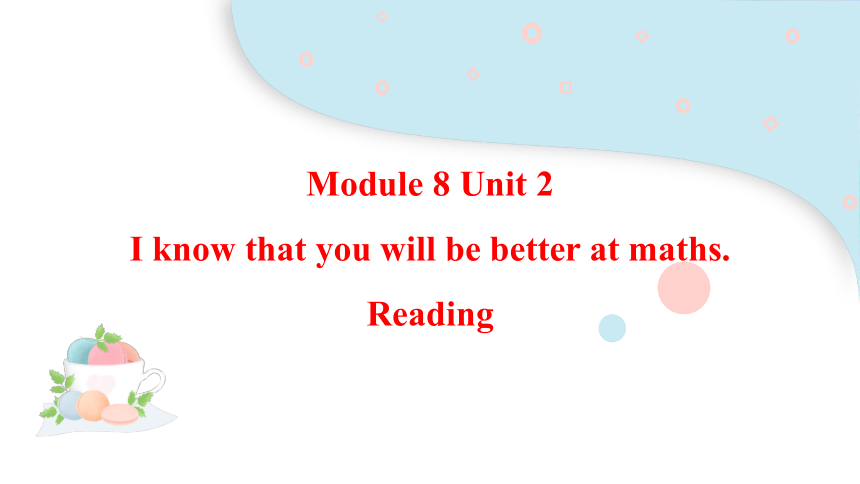
|
|
| 格式 | pptx | ||
| 文件大小 | 3.5MB | ||
| 资源类型 | 教案 | ||
| 版本资源 | 外研版 | ||
| 科目 | 英语 | ||
| 更新时间 | 2025-04-27 00:00:00 | ||
图片预览

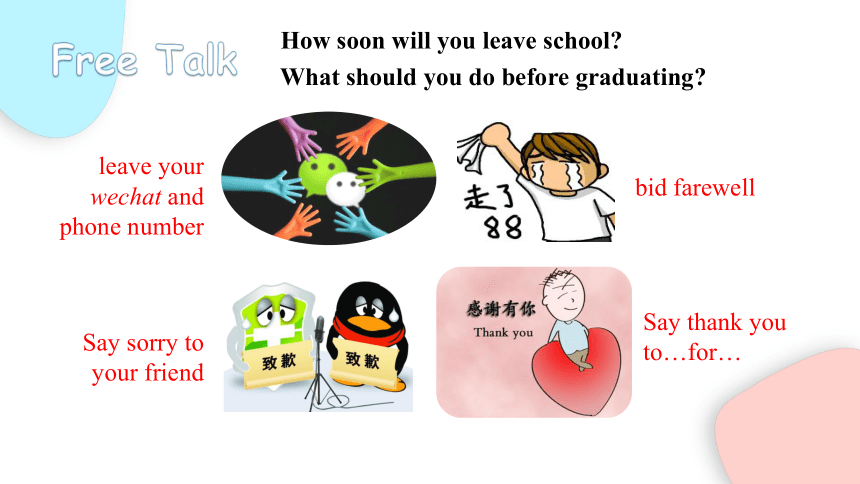
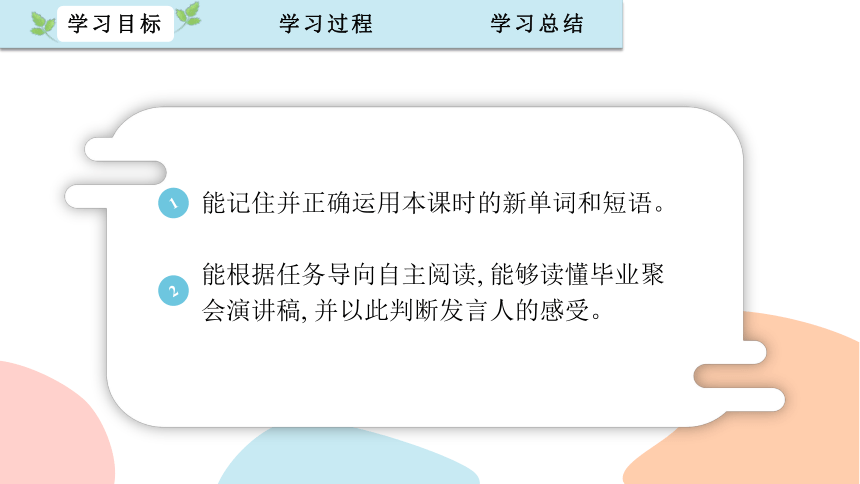
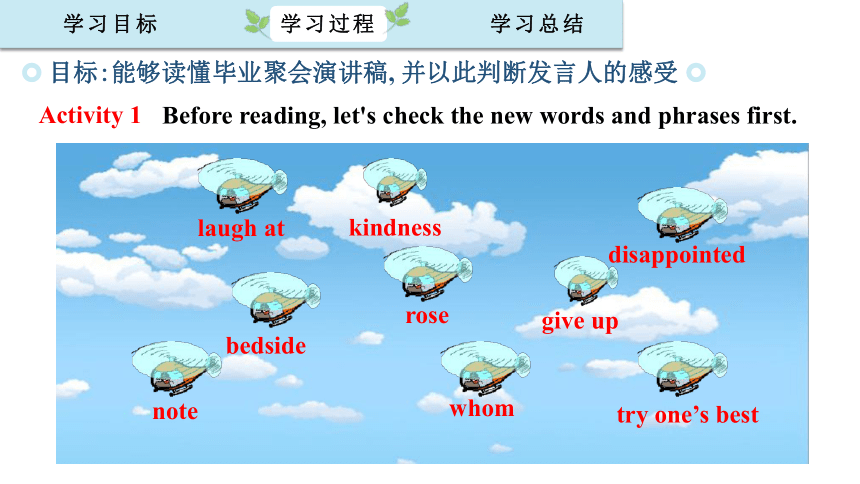
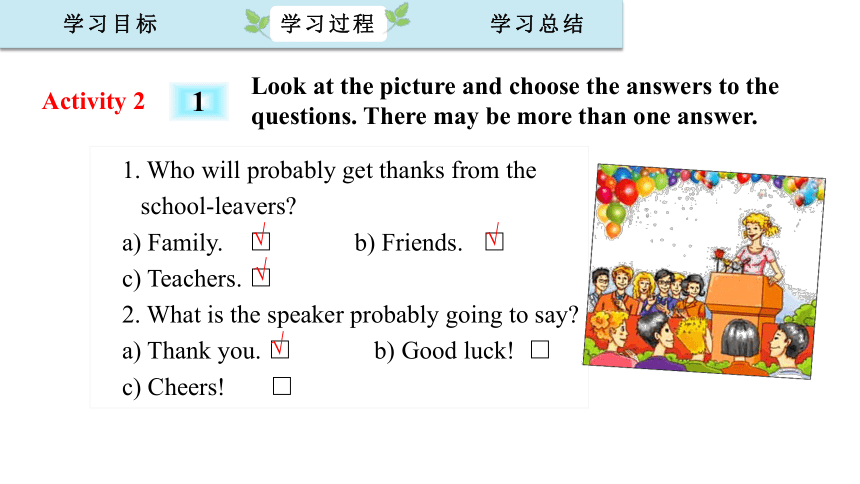
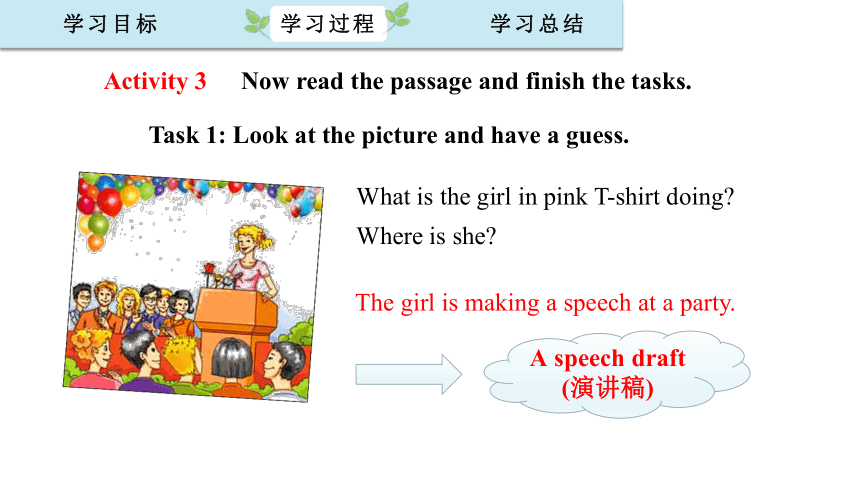
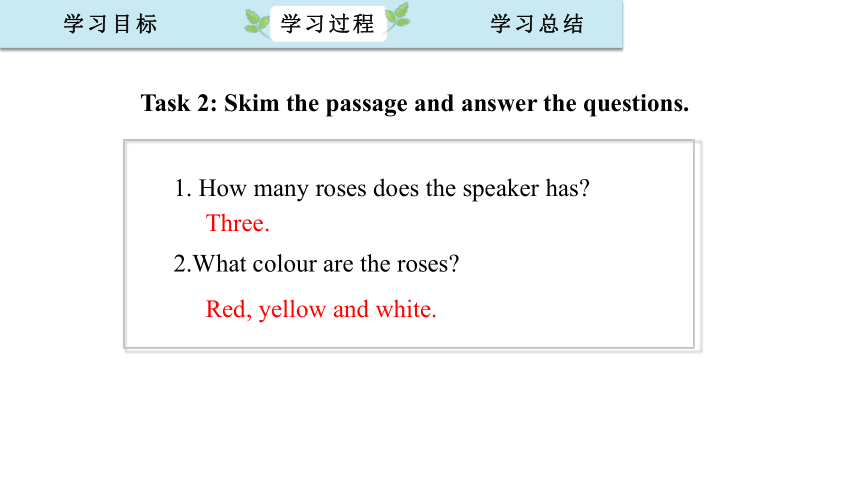
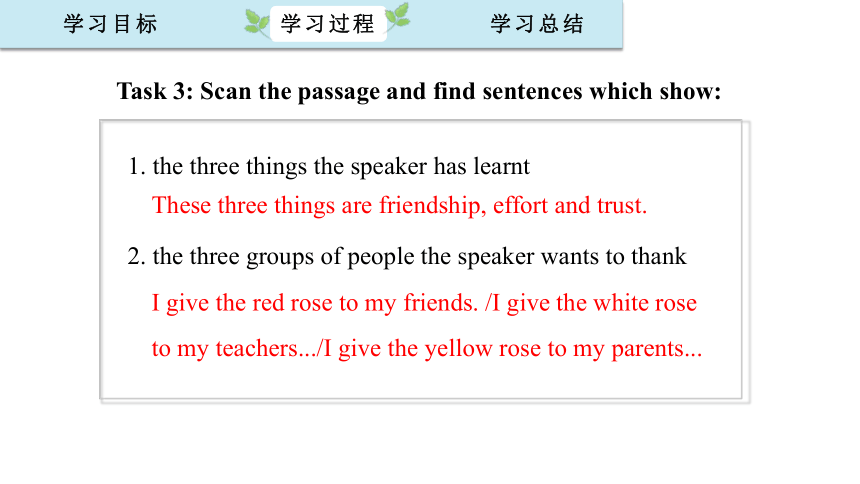
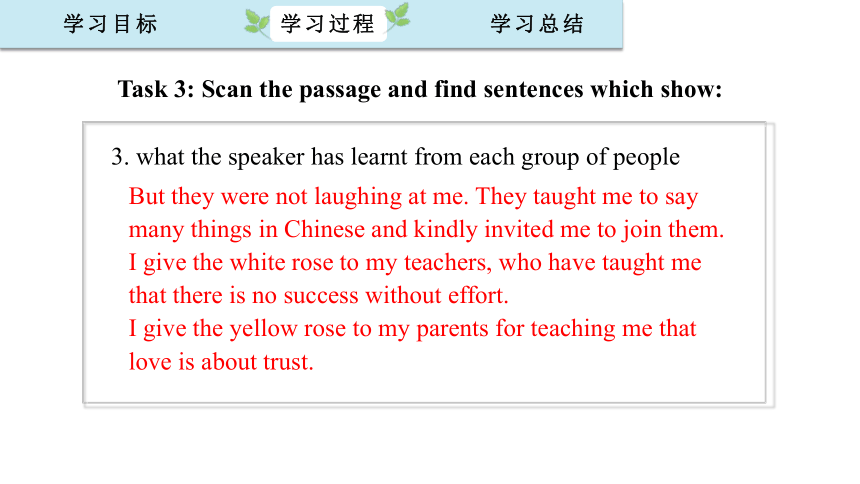
文档简介
(共22张PPT)
Module 8 Unit 2
I know that you will be better at maths.
Reading
Free Talk
How soon will you leave school
What should you do before graduating
bid farewell
leave your
wechat and
phone number
Say thank you
to…for…
Say sorry to
your friend
1
2
能记住并正确运用本课时的新单词和短语。
能根据任务导向自主阅读, 能够读懂毕业聚会演讲稿, 并以此判断发言人的感受。
目标:能够读懂毕业聚会演讲稿, 并以此判断发言人的感受
Activity 1
Before reading, let's check the new words and phrases first.
whom
give up
kindness
disappointed
rose
bedside
note
try one’s best
laugh at
Activity 2
1
Look at the picture and choose the answers to the questions. There may be more than one answer.
1. Who will probably get thanks from the
school-leavers
a) Family. □ b) Friends. □
c) Teachers. □
2. What is the speaker probably going to say
a) Thank you. □ b) Good luck! □
c) Cheers! □
√
√
√
√
Activity 3
Now read the passage and finish the tasks.
Task 1: Look at the picture and have a guess.
What is the girl in pink T-shirt doing Where is she
The girl is making a speech at a party.
A speech draft (演讲稿)
Task 2: Skim the passage and answer the questions.
1. How many roses does the speaker has
2.What colour are the roses
Three.
Red, yellow and white.
Task 3: Scan the passage and find sentences which show:
1. the three things the speaker has learnt
2. the three groups of people the speaker wants to thank
These three things are friendship, effort and trust.
I give the red rose to my friends. /I give the white rose
to my teachers.../I give the yellow rose to my parents...
Task 3: Scan the passage and find sentences which show:
3. what the speaker has learnt from each group of people
But they were not laughing at me. They taught me to say many things in Chinese and kindly invited me to join them.
I give the white rose to my teachers, who have taught me that there is no success without effort.
I give the yellow rose to my parents for teaching me that love is about trust.
Task 4.1: Read Para. 1~2 carefully and complete the table
1. What’s Betty’s feeling when she made the speech
2. What does Betty use to thank many people
3. What has Betty learnt from her friends, teachers and
parents
She is very proud.
Roses.
Friendship, effort and trust.
Task 4.2: Read Para. 3~5 carefully and fill in the table.
Friends They taught me to s _____ Chinese. Thanks to their k ________, I learn Chinese better.
Teachers They taught me there is no s _______ without effort. I’ll t ____________ and never give up.
Parents They teach me love is about trust. My father believes I will be b ______ at maths.
indness
uccess
ry my best
peak
etter
Task 4.3: Read Para. 6 carefully and tell true (T) or false (F).
1. We all have our happy memories during the last ( )
three years.
2. We needn’t thank people for the happiness we ( )
shared with them.
3. Lingling wants to say thanks to friends , teachers ( )
and parents.
need
Betty
T
F
F
Task 5: After reading and now answer the questions.
1.Which sentence in Paragraph 4 means “You have to work hard to succeed”
2. “You only really lose if you give up!” What does the sentence mean
3. “I’m sure you will be good at music. I know that you will be better at maths.”
What did Betty’s father want her to do
4. How do you think Betty would write to her father in reply
5. “I’m sure that you all have your own memories about the happiness of the last three years, and the people whom you want to thank for it...” What does it mean
There is no success without effort.
If you stop trying, you can never succeed.
Her father wanted her to work harder at maths and enjoy music.
She would write and say thank you for the violin and the advice.
It refers to the happiness of the last three years.
Activity 4
Work in groups. Find out some language points that you think are important and share their use with your classmates and give some examples.
Language points:_______________________
_____________________________________
_____________________________________
____________________________________
_____________________________
Language points
1. I’m very proud that you have chosen me to speak to you today.
be proud that 后接从句, 为……感到骄傲/自豪
类似还有 be proud of = take pride in 后接让人引以为荣的对象, 为名词、动词-ing形式。
e.g. The young mother was proud that her son succeeded.
e.g. The young mother took pride in her son’s success.
= The young mother was proud of her son’s success.
2. Of course some people laughed, and I felt quite silly.
silly 是一个无伤大雅,甚至显得童稚可爱的词汇,如父母可以说孩子silly,但没有一个父母会认为自己的孩子 foolish 或stupid。
e.g. You silly child. 你这个傻孩子。(并无贬意)
foolish 语气次之,通常形容由于缺乏常识,判断能力有限而做出不恰当的决定。反义词wise。
e.g. It is foolish of her to spend so much money on her shoes.
stupid 语气最强。一般指某人缺乏正常的理解力,智力上有天生的缺陷,所以这是一个贬义词。
e.g. I made a stupid mistake.
【辨析】silly, foolish/stupid 都有“蠢“的含义
3. I give the white rose to my teachers, who have taught me that
there is no success without effort.
who have taught me that there is no success without effort 是一个非限定性定语从句,对前面的先行词teachers进行信息的补充,而不是限定性描述。
非限定性定语从句中的关系代词不能省略。
这个非限定性定语从句中还包含一个宾语从句 that there is no success without effort, 作 have taught 的宾语。
4. She ran along with me, and she said, “You only really lose
if you give up!”
give up 意为“放弃”,后接名词、代词或动词-ing形式。后接代词作宾语时,须将代词置于give 和up之间。
e.g. You should give up smoking. It is bad for your health.
e.g. There is no help for it but give it up.
5. I still can’t run fast enough, but I’ve learnt to try my best, not only
with running but with whatever else I do.
not only ... but (also) ...意为“不但……而且 ……”,在应用时要遵循以下三个原则:
A. 并列原则:not only ... but also ...并列连词,连接两个并列成分,其中also可省略。
e.g. He not only studies hard but also works well.
他不仅学习努力,而且认真工作。
B. 主谓一致原则:not only…but also…连接两个并列主语时,
谓语动词在人称和数上要与but also后的主语保持一致。
e.g. Not only he but also I am interested in pop music.
不仅是他而且我也对流行音乐感兴趣。
C. 倒装原则:not only…but also ...连接两个并列分句时,not only 置于句首,表示强调,其引导的句子要用部分倒装,即将谓语动词的一部分(如情态动词、助动词等)放在主语的前面,而but also 的句子用正常语序。
e.g. Not only did he make a promise, but also he kept it.
他不仅做出了许诺,而且履行了诺言。
Activity 5
4
Check the answers to the questions. There may be more than one answer.
1. Which words can you use to describe the speech in Activity 1
2. Which sentence(s) will you probably find in speeches at a
school-leavers’ party
a) Thank you, friends, teachers and parents.
b) We’ll always stay in touch.
c) I’m proud to be chosen to speak to you.
d) Let’s all stand up and say…
careful excited moving polite
silly troubled warm worried
仔细的
激动的
感人的
有礼貌的
傻的
麻烦的
温暖的
担心的
a, b, c, d
Fill in the blanks and retell the passage.
friends
yellow rose
love is about trust
no success without effort
Chinese is much better
Module 8 Unit 2
I know that you will be better at maths.
Reading
Free Talk
How soon will you leave school
What should you do before graduating
bid farewell
leave your
wechat and
phone number
Say thank you
to…for…
Say sorry to
your friend
1
2
能记住并正确运用本课时的新单词和短语。
能根据任务导向自主阅读, 能够读懂毕业聚会演讲稿, 并以此判断发言人的感受。
目标:能够读懂毕业聚会演讲稿, 并以此判断发言人的感受
Activity 1
Before reading, let's check the new words and phrases first.
whom
give up
kindness
disappointed
rose
bedside
note
try one’s best
laugh at
Activity 2
1
Look at the picture and choose the answers to the questions. There may be more than one answer.
1. Who will probably get thanks from the
school-leavers
a) Family. □ b) Friends. □
c) Teachers. □
2. What is the speaker probably going to say
a) Thank you. □ b) Good luck! □
c) Cheers! □
√
√
√
√
Activity 3
Now read the passage and finish the tasks.
Task 1: Look at the picture and have a guess.
What is the girl in pink T-shirt doing Where is she
The girl is making a speech at a party.
A speech draft (演讲稿)
Task 2: Skim the passage and answer the questions.
1. How many roses does the speaker has
2.What colour are the roses
Three.
Red, yellow and white.
Task 3: Scan the passage and find sentences which show:
1. the three things the speaker has learnt
2. the three groups of people the speaker wants to thank
These three things are friendship, effort and trust.
I give the red rose to my friends. /I give the white rose
to my teachers.../I give the yellow rose to my parents...
Task 3: Scan the passage and find sentences which show:
3. what the speaker has learnt from each group of people
But they were not laughing at me. They taught me to say many things in Chinese and kindly invited me to join them.
I give the white rose to my teachers, who have taught me that there is no success without effort.
I give the yellow rose to my parents for teaching me that love is about trust.
Task 4.1: Read Para. 1~2 carefully and complete the table
1. What’s Betty’s feeling when she made the speech
2. What does Betty use to thank many people
3. What has Betty learnt from her friends, teachers and
parents
She is very proud.
Roses.
Friendship, effort and trust.
Task 4.2: Read Para. 3~5 carefully and fill in the table.
Friends They taught me to s _____ Chinese. Thanks to their k ________, I learn Chinese better.
Teachers They taught me there is no s _______ without effort. I’ll t ____________ and never give up.
Parents They teach me love is about trust. My father believes I will be b ______ at maths.
indness
uccess
ry my best
peak
etter
Task 4.3: Read Para. 6 carefully and tell true (T) or false (F).
1. We all have our happy memories during the last ( )
three years.
2. We needn’t thank people for the happiness we ( )
shared with them.
3. Lingling wants to say thanks to friends , teachers ( )
and parents.
need
Betty
T
F
F
Task 5: After reading and now answer the questions.
1.Which sentence in Paragraph 4 means “You have to work hard to succeed”
2. “You only really lose if you give up!” What does the sentence mean
3. “I’m sure you will be good at music. I know that you will be better at maths.”
What did Betty’s father want her to do
4. How do you think Betty would write to her father in reply
5. “I’m sure that you all have your own memories about the happiness of the last three years, and the people whom you want to thank for it...” What does it mean
There is no success without effort.
If you stop trying, you can never succeed.
Her father wanted her to work harder at maths and enjoy music.
She would write and say thank you for the violin and the advice.
It refers to the happiness of the last three years.
Activity 4
Work in groups. Find out some language points that you think are important and share their use with your classmates and give some examples.
Language points:_______________________
_____________________________________
_____________________________________
____________________________________
_____________________________
Language points
1. I’m very proud that you have chosen me to speak to you today.
be proud that 后接从句, 为……感到骄傲/自豪
类似还有 be proud of = take pride in 后接让人引以为荣的对象, 为名词、动词-ing形式。
e.g. The young mother was proud that her son succeeded.
e.g. The young mother took pride in her son’s success.
= The young mother was proud of her son’s success.
2. Of course some people laughed, and I felt quite silly.
silly 是一个无伤大雅,甚至显得童稚可爱的词汇,如父母可以说孩子silly,但没有一个父母会认为自己的孩子 foolish 或stupid。
e.g. You silly child. 你这个傻孩子。(并无贬意)
foolish 语气次之,通常形容由于缺乏常识,判断能力有限而做出不恰当的决定。反义词wise。
e.g. It is foolish of her to spend so much money on her shoes.
stupid 语气最强。一般指某人缺乏正常的理解力,智力上有天生的缺陷,所以这是一个贬义词。
e.g. I made a stupid mistake.
【辨析】silly, foolish/stupid 都有“蠢“的含义
3. I give the white rose to my teachers, who have taught me that
there is no success without effort.
who have taught me that there is no success without effort 是一个非限定性定语从句,对前面的先行词teachers进行信息的补充,而不是限定性描述。
非限定性定语从句中的关系代词不能省略。
这个非限定性定语从句中还包含一个宾语从句 that there is no success without effort, 作 have taught 的宾语。
4. She ran along with me, and she said, “You only really lose
if you give up!”
give up 意为“放弃”,后接名词、代词或动词-ing形式。后接代词作宾语时,须将代词置于give 和up之间。
e.g. You should give up smoking. It is bad for your health.
e.g. There is no help for it but give it up.
5. I still can’t run fast enough, but I’ve learnt to try my best, not only
with running but with whatever else I do.
not only ... but (also) ...意为“不但……而且 ……”,在应用时要遵循以下三个原则:
A. 并列原则:not only ... but also ...并列连词,连接两个并列成分,其中also可省略。
e.g. He not only studies hard but also works well.
他不仅学习努力,而且认真工作。
B. 主谓一致原则:not only…but also…连接两个并列主语时,
谓语动词在人称和数上要与but also后的主语保持一致。
e.g. Not only he but also I am interested in pop music.
不仅是他而且我也对流行音乐感兴趣。
C. 倒装原则:not only…but also ...连接两个并列分句时,not only 置于句首,表示强调,其引导的句子要用部分倒装,即将谓语动词的一部分(如情态动词、助动词等)放在主语的前面,而but also 的句子用正常语序。
e.g. Not only did he make a promise, but also he kept it.
他不仅做出了许诺,而且履行了诺言。
Activity 5
4
Check the answers to the questions. There may be more than one answer.
1. Which words can you use to describe the speech in Activity 1
2. Which sentence(s) will you probably find in speeches at a
school-leavers’ party
a) Thank you, friends, teachers and parents.
b) We’ll always stay in touch.
c) I’m proud to be chosen to speak to you.
d) Let’s all stand up and say…
careful excited moving polite
silly troubled warm worried
仔细的
激动的
感人的
有礼貌的
傻的
麻烦的
温暖的
担心的
a, b, c, d
Fill in the blanks and retell the passage.
friends
yellow rose
love is about trust
no success without effort
Chinese is much better
同课章节目录
- Module 1 Travel
- Unit 1 We toured the city by bus and by taxi
- Unit 2 It's a long story.
- Unit 3 Language in use
- Module 2 Education
- Unit 1 They don't sit in rows.
- Unit 2 What do I like best about school?
- Unit 3 Language in use
- Module 3 Life now and then
- Unit 1 They sometimes work harder.
- Unit 2 I think life is better today.
- Unit 3 Language in use.
- Module 4 Rules and suggestions
- Unit 1 You must be careful of falling stones.
- Unit 2 we must keep the camp clean.
- Unit 3 Language in use.
- Revison A
- Module 5 Look after yourself
- Unit 1 We'd better get you to hospital.
- Unit 2 Get off the sofa!
- Unit 3 Language in use.
- Module 6 Eating togethe
- Unit 1 When is the school-leavers' party?
- Unit 2 Knives and forks are used for most Western
- Unit 3 Language in use
- Module 7 English for you and me
- Unit 1 Have you ever been to an English corner?
- Unit 2 We all own English.
- Unit 3 Language in use
- Module 8 My future life
- Unit 1 Here's to our friendship and the future
- Unit 2 I know that you will be better at maths.
- Unit 3 Language in use
- Revison B
